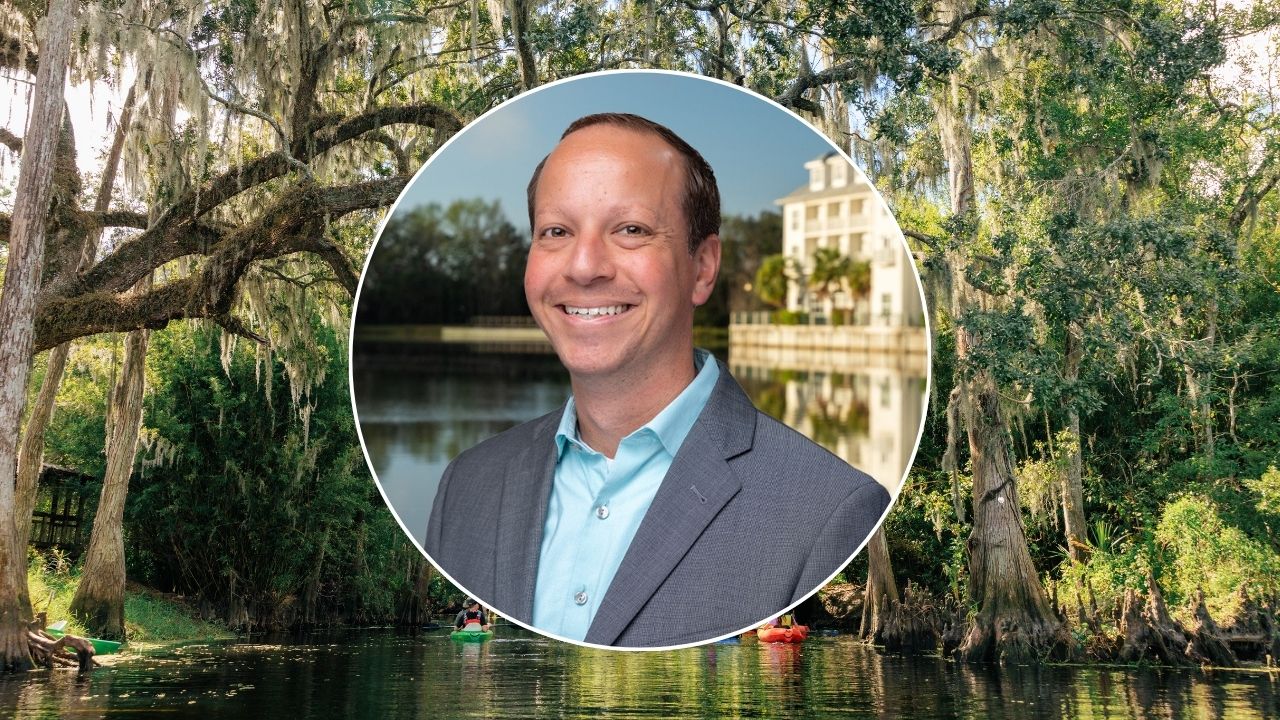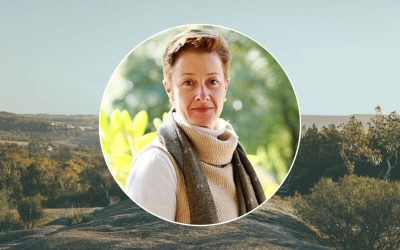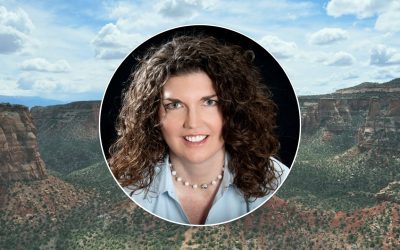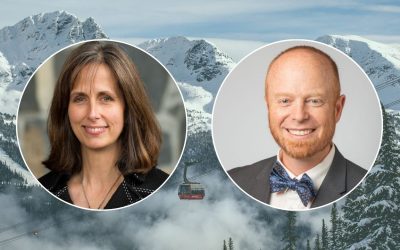“Even those places that are seemingly built and solely focused on mass tourism can take a step forward and say, let’s see if we can do things more sustainably… That first step is the most important part of the journey.” – Jason Holic
Kissimmee, Florida, a destination known for mass tourism, is becoming a leader in community stewardship and sustainability.
Jason Holic, Chief of Destination Stewardship for Experience Kissimmee, reveals how this Central Florida destination is evolving beyond its status as the gateway to Disney World. While Disney remains the world’s largest single-site employer and drives significant economic impact, Kissimmee offers visitors a unique blend of world-famous theme parks, pristine natural landscapes at the headwaters of the Everglades, rich cattle ranching heritage, and vibrant Latin American culture.
In this episode of Travel Beyond, we’ll explore Experience Kissimmee’s actions toward sustainable tourism through its Trees for Travel program, which plants trees based on meeting room nights to offset emissions while supporting UN Sustainable Development Goals. Their purpose-built vacation rental communities avoid displacing residents while creating resort-like experiences, and their commitment to spreading tourism benefits throughout the community demonstrates how tourism destinations can embrace meaningful stewardship.
We’ll discover how Kissimmee balances rapid population growth, economic diversification through projects like Neo City semiconductor campus, and community collaboration while maintaining its welcoming, customer service-oriented culture.
This episode, you’ll learn:
- How Kissimmee’s Trees for Travel programme has planted over 140,000 trees globally while supporting women’s entrepreneurship in Nepal through innovative meeting incentives.
- Why Kissimmee’s purpose-built vacation rental developments create resort-like amenities without displacing local residents, featuring private pools and on-site chef services.
- What makes Kissimmee’s cultural diversity unique, featuring authentic cattle ranching operations alongside one of the largest Puerto Rican populations on the mainland United States.
- Why Kissimmee’s longest-running rodeo east of the Mississippi River connects World War II history with ongoing community traditions.
- How Neo City’s semiconductor manufacturing campus represents economic diversification while creating new opportunities for destination marketing collaboration.
Subscribe to Travel Beyond through Apple Podcasts, Spotify, or your favourite podcast player.
Show notes
Experience Kissimmee – The official destination marketing organization leading Kissimmee’s transformation toward sustainable tourism and community stewardship.
National Ability Center – Partner organization providing autism-friendly training that Kissimmee has helped subsidize for over a dozen local tourism partners.
Neo City Kissimmee – The major semiconductor manufacturing campus representing Kissimmee’s economic diversification efforts beyond tourism dependency.
Pioneer Village at Shingle Creek – Historical society featuring authentic buildings where Experience Kissimmee helped plant over 200 native trees as part of their sustainability initiatives.
Shingle Creek Regional Park – The headwaters of the Florida Everglades, offering visitors authentic natural experiences in Central Florida’s unique ecosystem.
Images provided by Experience Kissimmee.
Episode transcript
Jason Holic: Even those places that are seemingly built and solely focused on mass tourism can take a step forward and say, let’s see if we can do things more sustainably.
Peter McCully: Welcome to Travel Beyond. I’m Peter McCully for Destination Think. On this episode, we look at travel’s role in making a better world. We highlight leading destinations and changemakers. Our guests are taking local action that the world can learn from. They’re helping to regenerate ecosystems, communities, and economies, and they’re often making positive change happen from the bottom up.
Many of the voices we’ve highlighted are part of the Destination Think Collective, a peer group of more than 20 ambitious, forward-thinking destinations working towards a better future for travel and the planet. We’re talking about how a destination known for mass tourism is transforming business meetings into global conservation efforts in Kissimmee, Florida.
The gateway to Disney World is proving that even the most tourism-intensive destinations can embrace meaningful stewardship. Experience Kissimmee has pioneered an innovative Trees for Travel program that plants trees around the world based on meeting room nights, supporting UN Sustainability Development Goals and women’s entrepreneurship in places like Nepal.
But trees aren’t their only innovation. The destination has created purpose-built vacation rental communities that offer resort-like amenities without displacing a single local resident, while celebrating everything from centuries-old cattle ranching heritage to vibrant Latin American culture. As Jason Holic puts it, visitors can go 15 minutes in one direction to sit in the shadows of a 200-year-old cypress tree along one of the world’s slowest-moving rivers, or 15 minutes the other way to experience one of the world’s most famous castles.
We spoke with Jason Holic, Chief of Destination Stewardship for Experience Kissimmee, about how reframing sustainability as stewardship creates meaningful change that benefits visitors, residents, and the planet.
Jason Holic: My name is Jason Holic, and I serve as the Chief of Destination Stewardship for Experience Kissimmee.
Peter McCully: Can you paint us a picture of Kissimmee for someone who hasn’t had the opportunity to visit the area?
Jason Holic: I’d be happy to. Most people associate Kissimmee, Florida, with Central Florida, which is of course known for its world-famous theme parks and other man-made built attractions. But what sets us apart are our unique and really fascinating natural landscapes and environment as well. We sit at the headwaters of the Everglades, which is one of the most important wetland ecosystems in the world, if not just the nation. But certainly, what we offer is a lot more than what most people associate with a typical Florida vacation.
We’re not beach. We’re not only theme park. We’ve got a little bit of everything, which I know a lot of destinations will say, but it’s true for us. You can go 15 minutes down the road and be in the shadows of 200-year-old cypress trees going down one of the slowest-moving rivers in the world, or you can go 15 minutes down the road in the other direction and sit in the shadow of one of the world’s most famous castles.
Peter McCully: Many people know Kissimmee as the gateway to Disney World and various theme parks. What kind of impact does Disney have on life in Kissimmee?
Jason Holic: The Walt Disney World Resort is the largest single-site employer in the world, so it has a profound economic impact on the community, and it has also spurred a tourism sector that is possibly unrivalled in the world. The greater Central Florida region is one of the most visited spots on the planet, and a lot of that is due to this built environment that we have that started back in the seventies with Walt Disney World Resort.
We have a lot of small businesses that thrive off of that. We have a lot of other large attractions that you may be aware of, like Universal Orlando Resort, which recently opened Epic Universe. Really, it is the responsible party for the largest part of our economy, and without our visitor economy, we don’t have a whole lot to sustain the population. We’re making great strides as a community to diversify because we know that tourism can be impacted by a lot of macroeconomic factors, but it has really driven a great strength of ours across all sectors outside of the visitor economy, and that is our hospitality and welcoming atmosphere.
Most people in the area have done some level of work within hospitality and tourism, and they take that customer experience, that customer service, into whatever the next sector is they work at.
Peter McCully: Jason, how would you describe local values? What are the residents most proud of about living in Kissimmee?
Jason Holic: There’s a lot to be proud of in Kissimmee and the local area, not the least of which is the proximity to the parks and things that people really know about. But also, we do take a lot of pride in the more traditional and cultural heritage aspects of our area. Before tourism was a great component of our economy, we were known for agriculture—lots of citrus farming, cattle ranching—and cattle ranching in particular still plays a strong role in our local community.
You’ll find a lot of families that can trace their roots five, six generations into the past in Florida, which is a lot. There aren’t many families that can say that in Florida, particularly in Central Florida, but we have a lot of it here, owing in large part to that cattle ranching culture. A lot of people take that local pride going all the way back, and many are newcomers. We’re one of the fastest-growing areas consistently in the United States, one of the fastest-growing counties, and a lot of people take pride in that also. We have a lot to offer a lot of people. We do welcome all those new residents. We welcome all these visitors, and we take—again, that great customer service that we all learn through our time in tourism—and we welcome residents just like we do all of our guests.
I mentioned in an earlier question our Latin American cuisine. That’s a huge part of our destination as well. We have one of the largest Puerto Rican populations on the mainland outside of New York and the island of Puerto Rico, and there’s a lot of pride behind that heritage as well. What’s really interesting about Kissimmee is it blends well with our longstanding five, six generations of Central Floridians with the more recent immigration from all sorts of Latin American countries and beyond.
Peter McCully: Jason, you talked about the local culture. What are some examples of non-Disney tourism experiences that represent local culture in Kissimmee?
Jason Holic: It’s great. I talked about the different aspects of the culture. We’re not just a monoculture down here. Of course, you can experience some of that cattle culture, if you will, because we still have operating ranches, and even those ranches, those agricultural enterprises, are seeking to tap into the visitor economy as well as a way of diversifying their income stream. It’s always been the case with agriculture that the crop, the harvest, is always susceptible to the weather conditions at the time, and that’s the same for us in Central Florida.
You’ll see a lot of ranches that offer more of those agritourism experiences—lots of “you-pick” for the local produce, cattle ranches where you can go on tours and see the operations, corn mazes, all sorts of things that really naturally overlap into the agricultural space. Perhaps most importantly, they introduce you to the people behind that agriculture. It’s usually the owners and operators of that land that will take you around and show you what they do, why they do it, why they’re proud of it, and the importance of it to not just the history of the community, but to its current state and to its future as well.
Beyond the heritage aspect, you have a lot of the Latin American populations that have migrated into the area. You’ve got tonnes of restaurants. We have entire food truck courts that can allow a visitor or a resident to taste their way around the world in just one spot without having to visit a theme park or anything like that. There are all sorts of really interesting things to do to experience the local culture.
One thing that doesn’t get quite as much press out to the visitors, but maybe should for those who are interested—we have the longest-running rodeo east of the Mississippi River, and it started around World War II as a way to help sell war bonds. You buy a war bond, you get admission to the rodeo, and it just built a long, strong community around it and has continued to be a cornerstone of the community based on that.
Peter McCully: Overall, how would you describe the cultural diversity of the area?
Jason Holic: Our cultural diversity is truly unique. I don’t know of many other places where you can find representation from nearly any Latin American country plus true cattle ranching that’s still in operation without it being just like a show. It’s a very unique mix and blend of cultures that we have in our destination. Like I said, we’re all built around customer service because we all have experience in tourism and hospitality, so we are here to show and showcase all of that diverse culture.
Peter McCully: You mentioned at the outset that Kissimmee sits at the headwaters of the Florida Everglades. What makes it special, and how can visitors experience that?
Jason Holic: The Florida Everglades is also nicknamed the River of Grass, and it is one of the slowest-moving rivers. Maybe a geologist wouldn’t classify it as a river, but it is a long, flowing, slow-flowing sheet of water. It naturally filters throughout this River of Grass into Lake Okeechobee and then out into the bodies of water that surround Florida. It all starts near Kissimmee at Shingle Creek. That’s the source that begins the Everglades.
A drop of water in Shingle Creek in Osceola County, if it doesn’t evaporate or get absorbed into plants, will flow all the way down into either the Gulf of Mexico or into the Atlantic Ocean. It’s really unique if you really take the time and experience that slowly and appreciate what it is. You can see the connection between really the entire water cycle and how it impacts local life. Again, those cattle that are on the ranches need the water and the grass. They need all of that to survive. That’s all part of their circle of life, and then all the homes that are built in the area as well.
Our water source is primarily the Florida Aquifer, and the water that seeps through, if it doesn’t go out into the water bodies beyond or evaporate, will eventually trickle down into the aquifer and then eventually into somebody’s tap.
Peter McCully: How do vacation homes factor into the travel experience in Kissimmee, Jason, and how does that change the travel experience compared to staying in a traditional hotel?
Jason Holic: What’s really unique—and I think that’s probably my most overused word in this podcast—but what’s really unique about the vacation home scene here in Kissimmee is that they are purpose-built in developments that are zoned specifically for short-term rentals. We’re not talking about your stereotypical Airbnb where somebody has a range of apartments in a city and they’re just renting them out, or they have extra dwelling space behind their house and they’re renting it out. These are developments, subdivisions, really entire single-family or multi-family resort areas built specifically for short-term rentals. It’s not displacing residents. It’s not creating that kind of conflict that you might see in other destinations.
The neighbour that you have in one of these developments is also visiting. They’re also here for vacation or for work. The experience is very unique because you’re at this resort short-term rental. You have your own house, maybe your own swimming pool in the backyard, and then some of them also have resort amenities. They could have pools with waterslides and restaurants on-site and all sorts of things that you’d normally see at a big hotel resort. Those amenities are still available in that short-term rental of your own house.
Around that has been built an entire ecosystem where you can enhance your experience if you want. Invite a private chef in. If you’ve got maybe a family reunion and you just want to hang out, maybe you’re tired of getting catered food, you can experience a chef cooking for you right in your own home and turn that into something really different that maybe you can’t find anywhere else. But it also gives the opportunity to maybe take a day away from some of the bigger, more crowded attractions. Maybe you’ve spent a few days at a theme park and your family just needs some time to unwind away from other families. You’ve got your own four walls. You’ve got your own fenced-in area. You’ve got your own transportation to and from wherever you want on demand if you have a rental car or your own vehicle.
It’s really a way to find that balance that we’re talking about, right? We have the balance between that heritage and history and the built attractions. The same can be true for your own accommodations. You can have that balance between “we have our own isolated space just for our party” and “we have the ability to go to these larger attractions and interact with other guests and maybe even some residents.”
Peter McCully: That certainly does sound unique. What does Kissimmee offer to sustainability-minded travellers?
Jason Holic: Sustainability is an ongoing conversation in Kissimmee, as it is within any destination. One of the more unique programs that we put together was back in May of 2023. We launched an add-on component to our meetings incentive programme. Experience Kissimmee would work with our tree-planting partner to plant 1,000 trees to help compensate for the emissions caused by that event. That was unique. It’s still ongoing, and it’s generated, to date, along with some of our other emissions reductions programs—we’ve worked on planting, I think, 140,000 trees since 2023 in various spots throughout the world.
Our tree-planting partner works with tree-planting organizations that are all aligned to various UN Sustainability Development Goals. For example, there’s a tree-planting organization they work with in Nepal that focuses on women’s entrepreneurship. They work with the women to grow and plant the trees and learn entrepreneurial skills. It’s not just the trees that we’re impacting; it’s actual local populations and building their skills and building sustainable practices within that region. That one is a newer one that we’re particularly proud of.
But beyond that, we’re actively working. We just finished our second year of participation in the GDS Index, the Global Destination Sustainability Index, to help us track and measure our progress and identify opportunities for us to engage with local stakeholders. Through that process, we’ve established relationships with our county Office of Sustainability to help promote some of the things that they’re doing.
An example of that would be we worked with our county, which has their own tree farm to grow trees and use them in right-of-way plantings or to give out to residents. We worked with them to identify an area in the county where our staff helped plant over 200 trees, and that was at the Pioneer Village, which is part of our historical society where they have built replicas or have found authentic buildings to create a pioneer village. We helped plant native tree species around that. That’s an asset that is valuable to both residents and to visitors that want to experience a little bit of that historical Florida.
Those are just a couple of examples of what we’re doing on the environmental sustainability side of things. As far as the social side, we’re working on ways of promoting those local restaurants that might not otherwise be part of the visitor economy because they’re outside of our traditional tourism corridor. We’re trying to spread that money to impact those individuals and help them feel direct benefit from the visitor economy.
We’re also working with various partners on some more health and wellness types of things. One is an inclusion programme for autism travel. We’ve worked with an autism training organization, and we’ve helped subsidize the training for over a dozen partners at this point so that their staff can be trained on how to recognize and how to best service families travelling with somebody in their party that has autism.
One thing that we recently launched was a water safety task force to help ensure that our visitors understand the importance of water safety around pools and natural bodies of water to prevent any sort of incident, as well as our residents.
Peter McCully: Jason, looking ahead, what do you hope travel will look like in Kissimmee in five to 10 years?
Jason Holic: I hope that travel in Kissimmee continues to expand beyond the traditional tourism corridor. That’s one of the things that I’m really focused on—spreading that visitor dollar throughout as many areas in the community as the residents want. It’s money coming in, new money coming into the community, and I think we’ll continue to see high marks for the value of tourism just as long as people continue to feel the net positive impact of it.
I think as we do that, we’ll continue to open up additional opportunities for us to understand, measure, and mitigate any of the negative impacts of tourism so that we don’t run into issues with overtourism and things that other destinations have run into. That’s really what I hope—that it continues to be a strong and valued community asset.
Peter McCully: What’s one thing you’d like travellers to take away from this story?
Jason Holic: We want your experience in Kissimmee to be something that creates long and lasting memories and that aligns with your personal values. My hope is that, in the next five to 10 years, we’ll have more and more information available to you through all of our channels, through all of our efforts, that can help you find that thing that you’re interested in. If it’s that theme park vacation, fantastic. But if it’s something that’s more sustainability-minded, we’re always looking for ways to surface that information to potential visitors. What we have on the website now might be far eclipsed in a short time with new information, and my hope is that is tremendously helpful for any potential visitor.
Peter McCully: This has been Travel Beyond, presented by Destination Think. Our thanks to Jason Holic from Experience Kissimmee. To learn more about the Trees for Travel Program and Kissimmee stewardship initiatives, you can visit experiencekissimmee.com. For more resources and show notes, visit our website at destinationthink.com.
This episode was hosted and co-produced by myself, Peter McCully. David Archer composed the theme music. Sara Raymond de Booy is co-producer. Lindsay Payne, Amy Bjarnason, and Cory Price provided production support.
If you like what you hear, please take a moment to give us a five-star rating. It helps more people find our show. Thanks for listening, and we’ll be back with more next week.










0 Comments